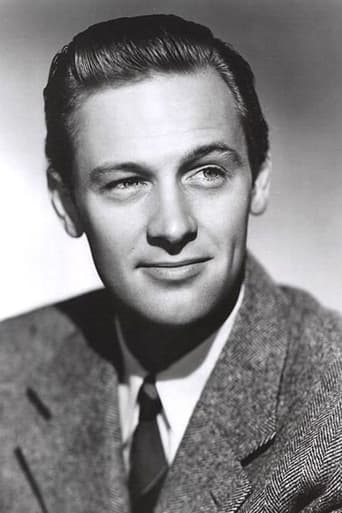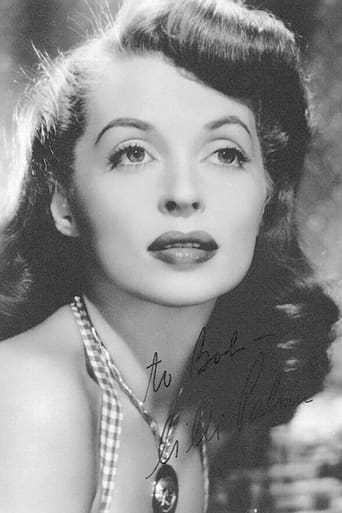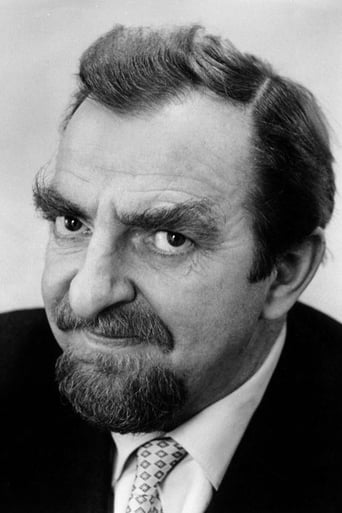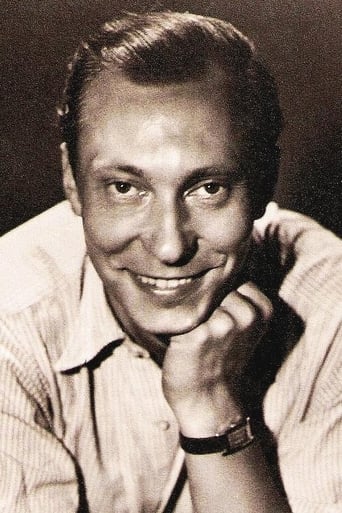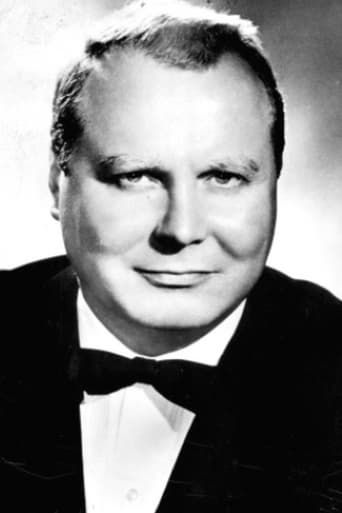CheerupSilver
Very Cool!!!
Grimerlana
Plenty to Like, Plenty to Dislike
Livestonth
I am only giving this movie a 1 for the great cast, though I can't imagine what any of them were thinking. This movie was horrible
JohnHowardReid
NOTES: The real-life Eric Erickson was 72 when the film was released, living in "quiet retirement" in Sweden and on the Riviera. He was re-instated in the eyes of his family and friends at a luncheon in his honor in Stockholm on 4 June 1945. Erickson told reporters in 1962 that he still carried in his wallet a photo of Marianne Mollendorf. Location scenes filmed in West Berlin, Hamburg, Copenhagen, Stockholm, and coastal villages of Sweden and Denmark.PRINCIPAL MIRACLE: A real-life story filmed without any major distortions.COMMENT: A well-produced and reasonably exciting spy thriller, which could have been even more forcefully dramatic given sharper playing - especially by the male lead - and more stylish direction. Oddly, none of my American colleagues agree with the above exceptions. All think Holden's performance extremely able, Seaton's direction sharp and vibrant. Not until I read the overseas reviews did I find myself no longer the odd critic out. It's not just simply that Holden plays Holden rather than Erickson, but that his performance for the most part is so tired, jaded, flat and shallow. Rarely does Holden bring Erickson to life. More often he is just an actor who has memorized his lines but mouths them with little expression and no conviction. As a director, Seaton can certainly stage his scenes competently, but he seems to go out of his way to avoid the extra punch of atmosphere and style. With Seaton, the script's the thing. He feels his immortal words need no embellishments. Certainly there is a bit of occasional action, but the dialogue scenes are all played slowly, methodically and monotonously. I'm mighty sick of the sight and sound of most of the players by journey's end. Particularly Hugh Griffith and Ernst Schroder. Those players I still like - Wolfgang Preiss as the Gestapo colonel and Charles Regnier as a German embassy official - have had the good sense not to out-stay their welcome. Even Lilli Palmer, fine actress though she generally is, gives an uneven account of herself here. Seaton's problem as a director is that he's afraid to let himself go. Afraid to trim superfluous or long-winded dialogue, afraid to let his cameraman throw a few mood shadows across his actors' faces, afraid to fully utilize the scenic impact of his real locations, afraid to clap on the pace. To George Seaton, shears and shadows are the enemy. OTHER VIEWS: Ingmar Bergman fans in particular and admirers of Swedish cinema in general are unlikely to be enamored of the cursory treatment accorded Ulf Palme and Eva Dahlbeck, whilst Klaus Kinski followers will be forced to wait a mighty long time to see their idol do a three-minute, no-dialogue stint (though it is one of the most memorable moments in the film). But then neither the Bergman nor Kinski cliques are likely to want to see The Counterfeit Traitor anyway. For $4½ million, neither the producer nor picturegoers seem to have gotten equivalent value for their money. Nonetheless, this picturization of a real-life drama does maintain a high degree of suspense throughout the twists and turns of an often hair-raising plot. Real locations help authenticity, and the principal players (in particular Holden, Palmer and Griffith) come across with honor. - JHR writing as George Addison.
Terrell-4
Think of The Counterfeit Traitor as a sprawling but engrossing three-part espionage novel with a daunting number of pages to get through. If you're like me, you'll have a good time. In fact, I think The Counterfeit Traitor, even with all its subsections and all of its 240 minutes, is one of the best of the WWII sagas. The hero is an adult, and director-writer George Seaton treats the audience as adults, too. It's the story of Eric Erickson (William Holden), a Swede who is a successful oil trader. Sweden is neutral and Erickson makes money trading with the allies as well as with Germany. In a bit of ruthless manipulation, a British intelligence agent named Collins (High Griffin) begins to ruin Erickson's reputation, then offers to clear him if Erickson, who is able to easily travel between Stockholm and Germany, gathers information on Germany's war effort and delivers it back to him. Erickson has little choice. Even so, to be effective he has to fool the Gestapo into believing he's genuine. Soon, in Sweden, he's convincing friends that he believes in Nazi Germany. In Germany, he uses blackmail to gather inside information from his German business friends. He has few allusions. He resents being forced into this double game. He loses a lot of self-esteem as he disappoints his Swedish friends and manipulates his German friends. Not only is he at risk every time he steps foot in Germany, he is putting in the shadow of the hangman's noose the Germans he has been working with. The only thing that changes his mind is an act of random brutality he witnesses at a German factory that uses Polish laborers. A man picked at random from a crowd is strung up on a hoist and strangles to death while his co-workers watch. Says a colleague of Erickson's, "You can read about a hundred atrocities, hear about a thousand, but you only have to see one." Erickson's contact in Berlin is Marianne Mollendorf (Lilli Palmer), a well-connected wife of an Army colonel. The game they play gets riskier with every visit Erickson makes. She knows the worth of what she is doing. When Erikson realizes the importance, too, it's not long before love follows. The movie is too long and could easily lose 30 minutes here and there. A lot of those minutes involve the inner angst of Erickson and Mollendorf. Their growing love is believable; their dialogue often has 'Hollywood' written all over it. There's some preaching, but not too much, and since most of it is delivered by Palmer it's at least bearable. She was not only a beautiful woman, she was a fine actress whose intelligence was much of her attractiveness. To my knowledge, she never played a dumb woman in a long career. On the other hand, watching an 11-year-old boy try to destroy Holden as Erickson is unnerving. Watching Holden try to destroy an 11-year-old boy is satisfying. The strength of the movie, from my point of view, is in its portrayal of blackmail, the application of leverage and the corruption by both sides to achieve their goals. This isn't a case of moral equivalency, just the way wars work, There are no armed battles, shoot 'em ups or breakouts, just a lot of slowly building tension, the accumulation of small mistakes and emotional exhaustion, and a terrible moment of betrayed faith and the consequences that arise from it. That leaves us with the last half of the movie and one exciting moment after another. Erickson goes back to Germany one last time to retrieve a critical document. This time he finds himself picked up by the Gestapo. His escape isn't pretty or easy, but it's a great ride...not for the derring do but for the tension and the intricacies of his escape, made possible by the many people who help him. If you never thought you'd become emotional about bicycles, you might surprise yourself. So we have Erickson's recruitment and first missions, Erickson and Mollendorf's work, their relationship and the consequences, and Erickson's complicated escape. The Counterfeit Traitor sprawls, but it's held together by William Holden's performance. He's a reluctant hero, then a committed one, but without bravado. The movie is an intelligent espionage thriller that owes a lot to Holden's contained, intelligent portrayal.
theresejames
There are some prerequisites for appreciating this excellent movie: 1.You need the attention span sufficient for the plot--e.g., more thanSesame Street.2.You need some basic understanding of World War II--no not everyone was equally guilty.3. You need the essential capacity for sentiment.4. You need the appreciation of love as more than some play in the sheets.The ultimate change in character of the opportunistic businessman of useful connections trapped in an espionage role finally into a selflessly committed one is great.
Nazi_Fighter_David
Born in Brooklyn, Eric Erickson (William Holden) is a naturalized Swedish businessman neutral enough to deal with both the Germans and Allies, until he discovers his name on a published list of Nazi sympathizers...Shocked and angry, he soon discovers that his inclusion on that list is a device to force him to work for British Intelligence whose representative, a sarcastic Collins (Hugh Griffith), he meets at the Stockholm Grand Hotel...Collins not only admits the blackmail, but compounds it by having the conversation taped to enforce Eric's cooperation, since the Swedes strongly value their neutrality... Disarmed as well as astonished by Collins' cynicism, Eric has to agree to become a spy, while the spy master, between courses of his luncheon, admits he would 'deal with thieves, liars, procurers, traitors, and sluts' to get the job done...Not only must Eric supply information on the German oil industry, he also has to act the part of someone on the Allied blacklist... Despite his real sympathies, Eric must make spiteful remarks about the Allies, and more importantly, has to drop sneering remarks about Jews and to insult publicly his Jewish best friend within hearing of the German ambassador... The friendship with the Third Reich's diplomat is needed to secure official sanction for Eric's plan to construct German oil refineries in Sweden—the means by which he is to secure the information the Allies want... Eric not only humors the optimal negotiator, he also promises him a share in the company he is forming and charmingly pays him the money lost in weekly bridge games... Eric begins his frequent business trips to Germany with a gala reception during which he makes contact with another agent, an irresistible woman with whom he is to pretend to have an affair, Mariana (Lilli Palmer).Mariana, wife of a high-ranking German officer, is both an idealist and an efficient spy... She would embrace and kiss Eric for the sake of any Gestapo man trailing them and then shake hands before getting down to the business of encoding messages... Her shock at Eric's selfish reasons for being a spy contrasted with her own, a firmly loyal belief in the Catholic religion to fight the Anti-Christ, Hitler... In perhaps the film's most moving scene, she tells Eric that 'one must not think of the war simply in terms of hundreds of tanks and thousand of planes and units of men, like some sort of wrestling match on a gigantic scale... but in terms of a single truck on its way to a concentration camp and what's shivering inside in.'Unlike many other spy films set during the war, 'The Counterfeit Traitor' stressed the personal and emotional cost of espionage: Eric, the spy-against-his-will, had not only to forsake his wife and friends who were upset by his apparent Nazi sympathies, he had also to witness Nazi atrocities... George Seaton's 'The Counterfeit Traitor' is sobering to a remarkable degree, mostly when Marianne discovers she has given her confession not to a priest; the questioning of Eric in Berlin's basement cell; Hitler Youth member Hans Holtz stealing Eric's briefcase with incriminating letter; and Eric's confrontation with Gestapo man Jaeger...

